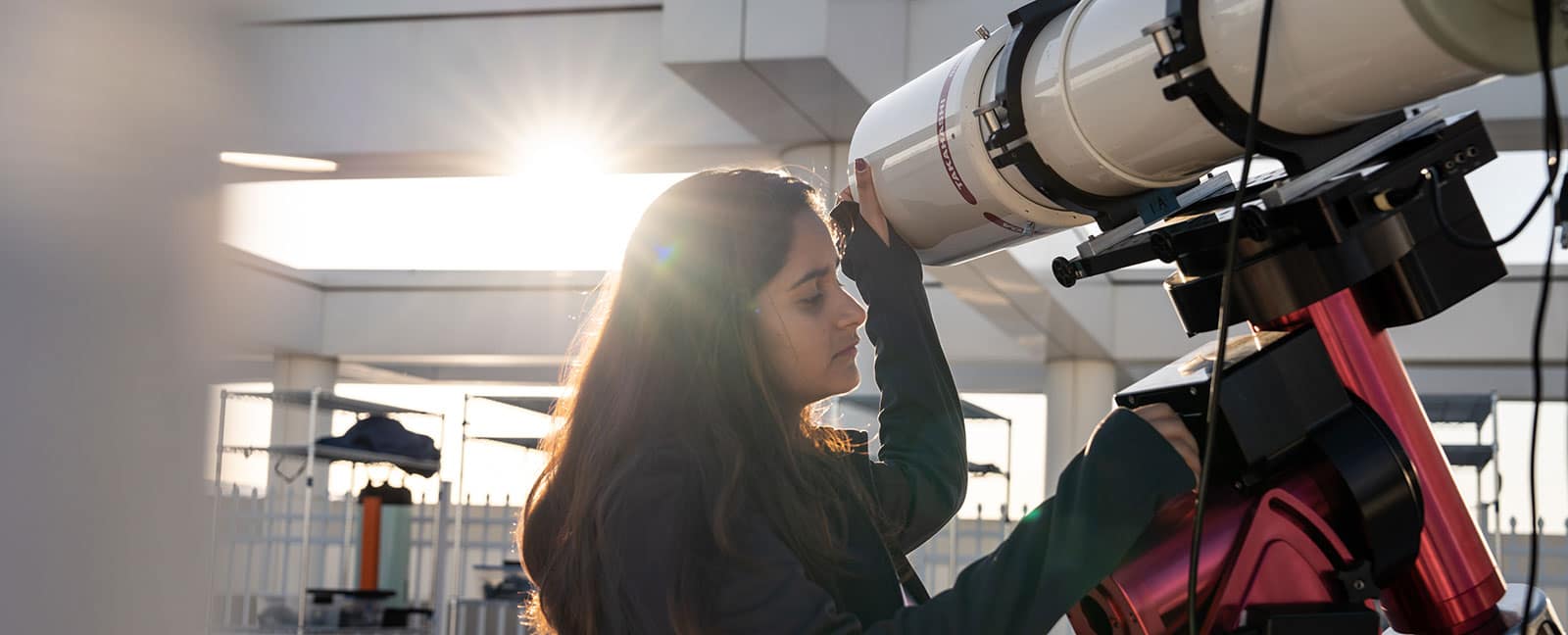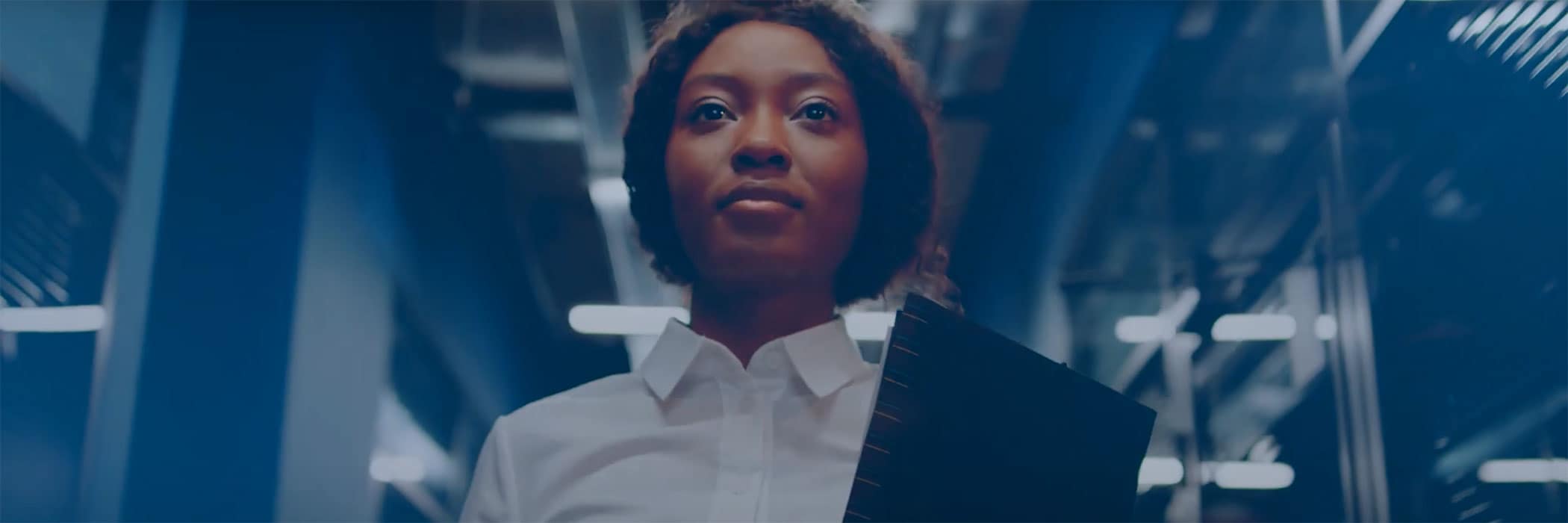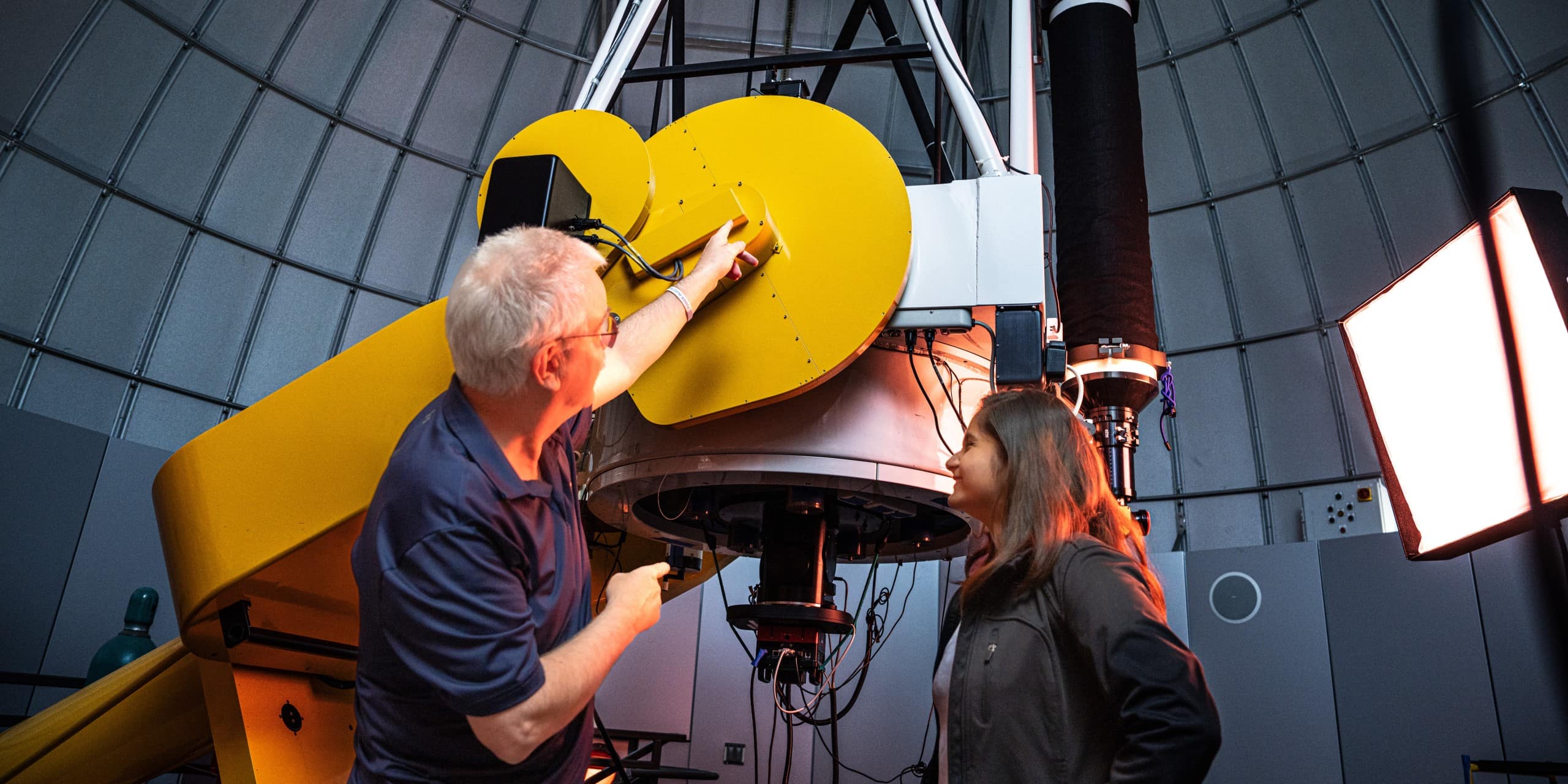
Bachelor of Science in
Astronomy and Astrophysics
The B.S. in Astronomy and Astrophysics prepares graduates with a solid base in math and physics to prepare students for a broad range of scientific careers.
About the Bachelor of Science in Astronomy and Astrophysics
At Embry‑Riddle Aeronautical University, students in the Bachelor of Science in Astronomy and Astrophysics program use a combination of physics and astronomy classroom courses, along with hands-on laboratory experiences, to understand and explore the universe.
The U.S. Bureau of Labor Statistics expects a 5% increase in physics and astronomy jobs between 2022 and 2032, and many students choose to continue to higher education, pursuing both their master’s and Ph.D. before entering the workforce. Embry‑Riddle offers students significant advantages, including connections to research experiences such as the Hubble Space Telescope, the Kepler Mission, the Transiting Earth Survey Satellite and the James Webb Space Telescope.
Student Learning Outcomes
Learning opportunities you will have while earning an astrophysics degree:
- Ability to apply astronomy models to real systems
- Communicate astronomical results to astronomers and non-astronomers
- Operate astronomical telescopes and detectors to obtain scientific data
- Develop and test physical models of astronomical systems
Astronomy and Astrophysics Career Opportunities
Careers and Employers
Embry‑Riddle astrophysics degree graduates often pursue graduate-level education in the field or find entry-level careers at Northrop Grumman, the Department of Energy, the U.S. Navy and Omitron, Inc.
Students earning an astronomy degree often pursue careers as:
- Data Engineers
- Software Engineers
- Data Scientists
Astronomy and Astrophysics Salary Information
A degree from Embry‑Riddle provides the opportunity for competitive salaries, averaging $83,000 as of 2023.
DETAILS
About Astronomy and Astrophysics at the Daytona Beach, FL Campus
The B.S. in Astronomy and Astrophysics at the Daytona Beach Campus has a strong fundamental basis in mathematics and physics. Housed in the Department of Physical Sciences in the College of Arts and Sciences, the program is a member of the Southeastern Association for Research in Astronomy (SARA), granting students almost continuous telescope access to nearly 90% of the sky.
The department’s space exploration observatory facilities include an instrumented 1-meter telescope (the largest university research telescope in the southeastern U.S.). Astronomy and Astrophysics students have access to dynamic labs on campus, including the Laboratory for Exosphere and Near Space Environment Studies (LENSES).
Astronomy and Astrophysics Information
- Credits: 120
- Online or In-Person: In-Person
Helpful Links
- Tour Our Daytona Beach Campus
- Discover the Department's Faculty
- Explore the Fields of Study: Space & Applied Science
- Find Related Clubs & Organizations
Student Learning Outcomes
Students will:
- Apply knowledge of mathematics and science.
- Analyze data derived from conducted experiments.
- Solve scientific problems.
- Communicate effectively.
- Have knowledge of contemporary issues.
- Show evidence of skills needed to enrich life through activities that enhance and promote lifelong learning in their career and personal life.
- Make professional and ethical decisions.
General Education Requirements
For a full description of Embry‑Riddle General Education guidelines, please see the General Education section of this catalog. These minimum requirements are applicable to all degree programs.
| Communication Theory & Skills | 9 | |
| Humanities - Lower level | 3 | |
| Social Sciences - Lower level | 3 | |
| Humanities or Social Sciences - Lower or Upper level | 3 | |
| Humanities or Social Sciences - Upper level | 3 | |
| Computer Science (EGR 115) | 3 | |
| Mathematics (MA 241, MA 242) | 8 | |
| Physical and Life Sciences - one course must include a lab (PS 226, PS 227) | 6 | |
| Total Credits | 38 | |
Core Requirements
| Astronomy & Astrophysics | ||
| AA 101 | Current Topics in Astrophysics | 1 |
| AA 316 | Introductory Astronomy and Astrophysics I | 3 |
| AA 317 | Introductory Astronomy and Astrophysics II | 3 |
| AA 318 | Introductory Astrophysics Laboratory | 1 |
| AA 345 | Astrophysics and Space Science Seminar | 2 |
| AA 401 | Stellar Astrophysics | 3 |
| AA 425 | Observational Astronomy | 3 |
| AA 492 | Senior Astrophysics Project (or Technical Elective) | 3 |
| Select two of the following: | 6 | |
| AA 402 | Interstellar Medium and Galaxies | 3 |
| AA 403 | Cosmology and the Structure of the Universe | 3 |
| AA 420 | Planetary Interiors, Surfaces, and Atmospheres | 3 |
| AA 422 | Solar System Dynamics | 3 |
| AA 430 | Astronomical Optics and Instrumentation Laboratory | 3 |
| Mathematics | ||
| MA 243 | Calculus and Analytical Geometry III | 4 |
| MA 345 | Differential Equations and Matrix Methods | 4 |
| MA 441 | Mathematical Methods for Engineering and Physics I | 3 |
| MA 442 | Mathematical Methods for Engineering and Physics II | 3 |
| Physical Science | ||
| CHM 110 | General Chemistry I | 3 |
| CHM 110L | General Chemistry I Laboratory | 1 |
| PS 226L | Physics I Laboratory | 1 |
| PS 228 | Physics III | 3 |
| PS 228L | Physics III Laboratory | 1 |
| PS 303 | Modern Physics | 3 |
| PS 305 | Modern Physics Laboratory | 1 |
| PS 320 | Classical Mechanics | 3 |
| PS 405 | Atomic Nuclear Physics | 3 |
| Engineering | ||
| EP 320 | Electro-Optical Engineering | 3 |
| EP 400 | Thermodynamics and Statistical Mechanics | 3 |
| EP 440 | Engineering Electricity and Magnetism | 3 |
| EP 455 | Quantum Mechanics | 3 |
| Technical Elective (300-400 Level) 1 | 6 | |
| Open Electives | 6 | |
| Total Degree Credits | 120 | |
- 1
Technical Electives: AA/AE/CEC/CIV/CS/EE/EGR/EL/EP/ES/MA/PS/SE 300-400 level (approved by Program Coordinator)
Suggested Plan of Study
| Year One | ||
|---|---|---|
| Fall | Credits | |
| AA 101 | Current Topics in Astrophysics | 1 |
| MA 241 | Calculus and Analytical Geometry I | 4 |
| CHM 110 | General Chemistry I | 3 |
| CHM 110L | General Chemistry I Laboratory | 1 |
| COM 122 | English Composition | 3 |
| Lower-level social science (SS/EC/GCS/PSY) 1 | 3 | |
| Credits Subtotal | 15.0 | |
| Spring | ||
| MA 242 | Calculus and Analytical Geometry II | 4 |
| PS 226 | Physics I | 3 |
| PS 226L | Physics I Laboratory | 1 |
| COM 219 | Speech | 3 |
| Lower-level humanities (HU) 1 | 3 | |
| Credits Subtotal | 14.0 | |
| Year Two | ||
| Fall | ||
| MA 243 | Calculus and Analytical Geometry III | 4 |
| PS 227 | Physics II | 3 |
| EGR 115 | Introduction to Computing for Engineers | 3 |
or CS 223
|
Scientific Programming in C | |
| COM 221 | Technical Report Writing 1 | 3 |
| AA 316 | Introductory Astronomy and Astrophysics I | 3 |
| Credits Subtotal | 16.0 | |
| Spring | ||
| MA 345 | Differential Equations and Matrix Methods | 4 |
| PS 228 | Physics III | 3 |
| PS 228L | Physics III Laboratory | 1 |
| AA 317 | Introductory Astronomy and Astrophysics II | 3 |
| AA 318 | Introductory Astrophysics Laboratory | 1 |
| Lower-level humanities or social science (HU/SS/EC/PSY/GCS) 1 | 3 | |
| Credits Subtotal | 15.0 | |
| Year Three | ||
| Fall | ||
| MA 441 | Mathematical Methods for Engineering and Physics I | 3 |
| PS 303 | Modern Physics | 3 |
| PS 305 | Modern Physics Laboratory | 1 |
| AA 401 | Stellar Astrophysics | 3 |
| Upper-level humanities or social science (HU/EC/GCS/HSI/PSY) 1 | 3 | |
| Open Electives | 3 | |
| Credits Subtotal | 16.0 | |
| Spring | ||
| MA 442 | Mathematical Methods for Engineering and Physics II | 3 |
| PS 320 | Classical Mechanics | 3 |
| EP 400 | Thermodynamics and Statistical Mechanics | 3 |
| AA 345 | Astrophysics and Space Science Seminar | 2 |
| Open Elective | 3 | |
| Credits Subtotal | 14.0 | |
| Year Four | ||
| Fall | ||
| EP 440 | Engineering Electricity and Magnetism | 3 |
| EP 455 | Quantum Mechanics | 3 |
| EP 320 | Electro-Optical Engineering | 3 |
| Technical Elective 2 | 3 | |
| Upper-level Astrophysics Elective 4 | 3 | |
| Credits Subtotal | 15.0 | |
| Spring | ||
| PS 405 | Atomic Nuclear Physics | 3 |
| AA 492 | Senior Astrophysics Project 3 | 3 |
| AA 425 | Observational Astronomy | 3 |
| Technical Elective 2 | 3 | |
| Upper-level Astrophysics Elective 4 | 3 | |
| Credits Subtotal | 15.0 | |
| Credits Total: | 120.0 | |
- 1
See this list of all approved General Education courses.
- 2
Technical Electives: AA/AE/CEC/CIV/CS/DS/EE/EGR/EL/EP/ES/MA/PS/SE 300-400 levels (approved by Program Coordinator)
- 3
Students not eligible for AA 492 will take an additional Technical Elective. Eligible students have finished EP 440 and MA 442 and have a cumulative GPA of 3.5 or greater OR a grade of B or better in all required 300-level EP/PS courses.
- 4
Choose from: AA 402, AA 403, AA 420, AA 422, AA 430
Get Started Now:
Summary
120 Credits
Estimate your tuition by using the Tuition Calculator
View Financial Aid Information
Learn about our General Education
Find out about transferring credits to this degree
Learn more about our Veterans & Military benefits
View our Academic Calendar




